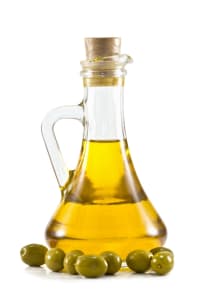by Rabbi Akiva Tendler, RC Dressings, Emulsifier, Oil
 Overview:
Overview:
With Chanukah quickly approaching our thoughts turn to olive oil used for the Menorah. Many people are confused with the various types of olive oil and those which can be used to fulfill the Hiddur Mitzvah of lighting with שמן זית. In this article we will attempt to “shed light” on this topic.
Background
Extra Virgin Olive Oil and Virgin Olive Oil production begins by transforming the olive fruit into olive paste by crushing the olives. The microscopic oil droplets concentrate and separate from the olive solids without chemical treatment.
The difference between Extra Virgin and Virgin is only in the acidic level of the oil. Extra Virgin Oil has less than .8% free fatty acid and Virgin Oil can have up to 2%. Neither one is blended with non-Olive Oil or with Refined Olive Oil.
Pomace is the solid substance left after the oil separates from the olive paste. Olive Pomace Oil is oil extracted from the Pomace using solvents. This oil is then refined and often blended with some Virgin Oil. It is fit for consumption, but may not be described simply as Olive Oil.
- Pure Olive Oil and Olive Oil are refined Olive Oil blended with Virgin Olive Oil of no more than 1.5% acidity. Virgin Oil is blended with the refined Oil since refined Oil commonly lacks strong flavor.
- Lampante Olive Oil is not suitable as food due to high acidity, poor flavor, and unpleasant odors.
The term Lampante comes from olive oil’s long-standing use in oil-burning lamps. Lampante oil is mostly used in the industrial market but is often found in Jewish stores before Chanuka. - Refined Olive Oil is the Olive Oil obtained from Virgin Olive Oils by refining methods that do not lead to alterations in the initial glyceridic structure. It has a free acidity of not more than .3%.
Note that no solvents are used to extract the oil, but it is refined with the use of charcoal and other chemical and physical filters.
Most bulk oils come to the USA following an inspection approved by the International Oil Council (IOC). In addition, every major bottling company has a laboratory for testing the quality of the oil.
Major brands in America test their competitor’s retail product for signs of adulteration. Therefore, there is no reasonable concern that a reputable brand will adulterate their oil. To date, no scientific study has concluded that there is adulteration by reputable companies presenting other oils as Virgin Olive Oil. However, little known brands that may hit the market at cheaper prices and fade away are suspected of adulteration.
Ruling:
It is the opinion of most poskim regarding Ner Chanuka that even Refined Oil that does not have a hechsher is acceptable. This is based on the position that for Ner Chanuka the oil does not need to be kosher [i] (i.e. מן המותר בפיך). An exception to this includes oils forbidden because of Basar B’chalav.
Others opine that oils used for Ner Chanuka should be kosher. Others further say that although is technically permitted to use non-kosher oils, one should do their best to use oil that has absolutely no doubts about its kosher status.
Conclusion:
In conclusion, any Extra Virgin or Virgin Olive Oil purchased at any major food supplier, or produced by any major brand, has no fear of adulteration and may be consumed. The OU encourages consumers to purchase Extra Virgin or Virgin Olive Oil with a reputable hechsher or from a well-known brand to negate all concerns. All other olive oils listed above must have a reputable hechsher to be consumed.
All olive oils, even if refined and not certified kosher, are acceptable for Ner Chanuka, as per most poskim.[ii] However, in the spirit of Mehadrin Min HaMehadrin it is praiseworthy to only use Olive Oil that is certified kosher.[iii]
For a longer article on this subject, kindly contact the author at tendlera@ou.org.
Footnotes:
[i] השיטות שצריך מן המותר בפיך לנר חנוכה שו”ת שנות חיים לר”ש קלוגר סימן רי”ח ושו”ת בית יצחק ח”ב קמ”ה. שיטות שאין צריך מן המותר בפיך לנר חנוכה שו”ת מהרש”ם ח”ט סי’ ל”ט, שו”ת דע”ת סימן ל”ט, חתם סופר סי’ ל”ט (ועיין עוד שדי חמד מערכת חנוכה סי’ י”ב).
[ii] עיין בהלכות חנוכה להגאון הרב שמואל קמינצקי שליט”א פרק ראשון אות ד’ שכתב אבל מהיות טוב להמנע מלהדליק נר חנוכה בשמן של איסור…
[iii] שם הערה ז’ בשם המהרש”ם. ועיין עוד פניני חנוכה פ”ז עמוד קמ”ד דדעת הגרי”ש אלישיב זצ”ל שהביטול ברוב אינו נותן להמיעוט המעלה של הרוב שיהי’ נחשב כשמן זית ויש חולקין ע’ שם.

